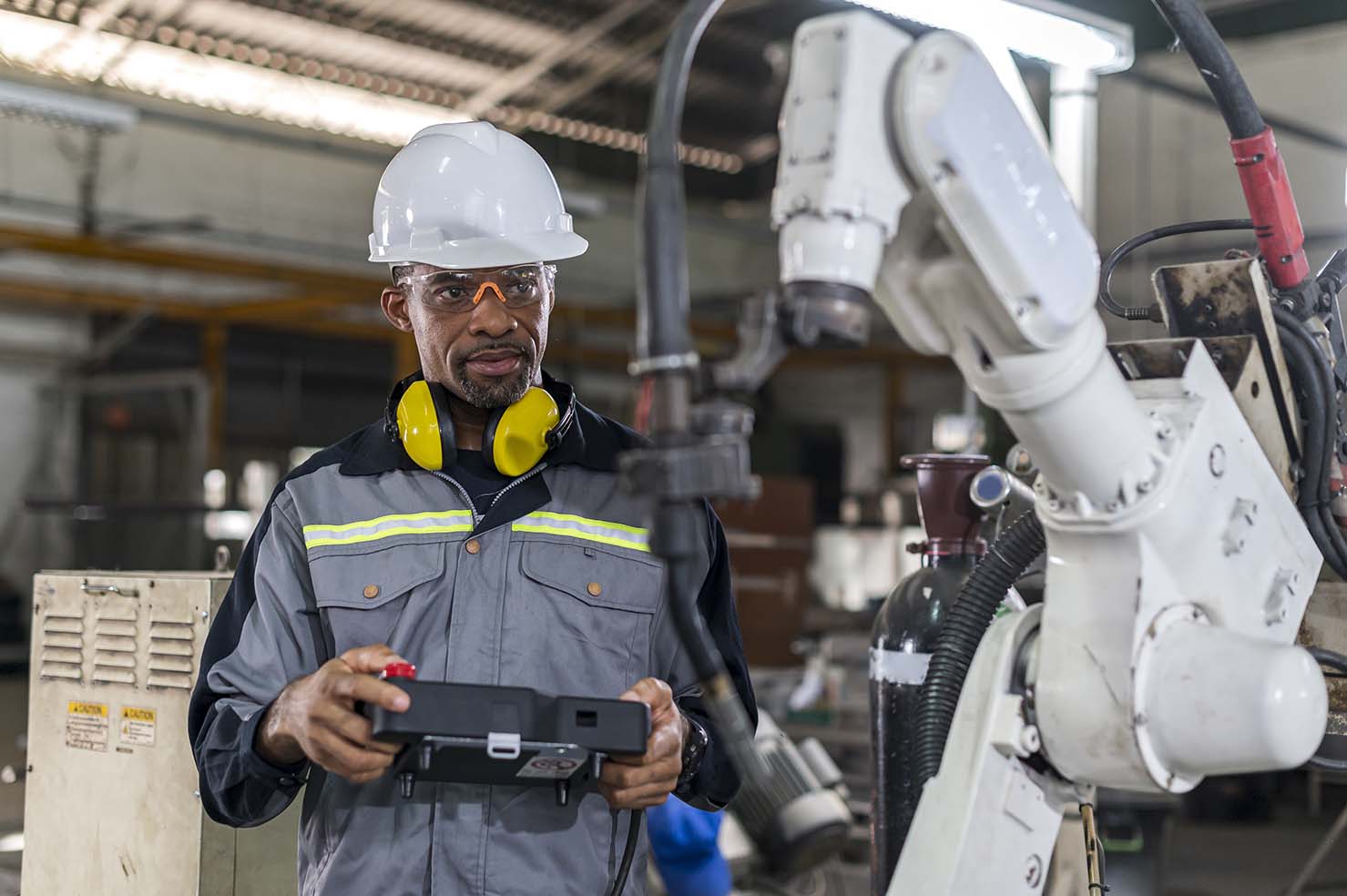

Automating the Supply Chain: Five Benefits of Using Cobotics
By Grainger Editorial Staff 6/23/20


What was once believed only to exist in factories of the future is now a reality thanks to the rapid adoption of cobotics in the supply chain. Collaborative robots, often referred to as “cobots,” are specialized devices that help workers accomplish their day to day jobs. Growing technological advances like the Internet of Things (IoT) and 5G technology are helping cobotics automate the supply chain and usher in the 4th Industrial Revolution.
As online sales continue to surge, along with the growing demand for same- or next-day delivery options, organizations need to reconsider traditional supply chain operations. According to DHL’s Robotics in Logistics Study, nearly 80 percent of distribution center operations are still performed manually with no supporting automation.
There are many opportunities to take advantage of collaborative robots throughout the supply chain, especially within manufacturing and warehousing operations. According to Robotics Online, cobots can help workers streamline dirty, dull, difficult, and dangerous applications, and achieve higher levels of efficiency and rapid productivity. Cobots can deliver all the advantages of advanced robotic automation without the added costs associated with programming, setup,and the separated work enclosures required for traditional industrial robots.
What Is Cobotics?
Cobotics is simply the practice of people and robots working together on daily tasks. Using machines to complete tasks that are dangerous, difficult, hazardous and repetitive allows businesses to use robotics to increase human ability rather than replace it. As BNP Paribas Fortis states, cobots can also learn new tasks and automate them to reproduce them indefinitely thanks to machine learning and the growing use of visual and auditory sensors.
Traditional industrial robots, according to Forbes, have become critical components on many industries for their ability to perform tasks often referred to as the four D’s “Dirty, Dangerous, Dear (Expensive) and Dull (or Demeaning)." Industrial robots can be found across various sectors from manufacturing and warehouses to healthcare. These industrial robots are often separated from humans to ensure they work reliably without causing harm. However, this traditional use of industrial robots often limits their application and power. Compared to traditional industrial robots, cobots are designed to operate alongside and close to their human counterparts.
Cobots are designed to enhance and coexist with human production, not take over individual jobs completely. VINCI Energies reports that although cobotics are typically equipped with the ability to perform remote diagnostics and maintenance, machine surveillance remains critical. Therefore, the staff who perform operations and predictive maintenance are one of the essential parts of the connected factory.
Grainger Inventory Management Report: Download our 2022-23 report based on a survey of 300 Grainger customers | Get the original 2021 report
Despite the many opportunities around adopting cobotics to help automate the supply chain, it’s a common fear among the workforce that increased use of robotics may cause them to lose their jobs. Companies can help shift their workers’ mindsets by helping them understand how robots can better support workers and can help to keep them safe and healthy to drive a wider adoption of cobotics in various industries.
Benefits of Cobots
1. Help Keep Workers Safe
While traditional industrial robots focus on assisting their human counterparts with the four D’s, cobots are designed to increase efficiency, effectiveness, and enhancement. Cobots can help with difficult, repetitive, or extremely labor-intensive tasks that can sometimes put workers at risk for injuries. Cobots allow their human counterparts to level up by augmenting workers' efforts. This allows human operators to better manage jobs that are dangerous, strenuous, or dull so they can focus on more complex tasks and provide more value to their organizations.
2. Increase Workflow Efficiency
Compared to traditional industrial robots, cobots are better able to adjust to frequent changes in demand and just-in-time inventory processes. Most cobots also require a human to either work alongside the machines or oversee them. This allows humans to still remain a vital part of workflows but provides the freedom to focus on complex problem solving, rather than repetitive, arduous tasks that are better suited for machines. Packaging Europe also reports that cobots are generally engineered as an out-of-the-box solution so that in less than an hour an untrained operator can unpack, mount and program a cobot. This allows companies to maximize their output and help get their products to market faster.
3. Advantages in Packing and Palletizing Tasks
Operations that require lifting and transporting heavy loads such as palletizing or shelving are key areas to consider adopting cobotic solutions. As companies are looking for automated solutions to improve efficiency or to solve labor shortage issues, robotic solutions are becoming attractive options for supporting packing and palletizing operations. According to RobotIQ, cobots can either be stationary or mounted on AGVs (automated guided vehicles). For packaging applications, cobots can inspect and sort products before putting them into cases. By quickly adapting production lines to new products or seasonal items, cobots offer increased fulfillment speeds and greater flexibility, which is essential in today’s fast-paced consumer-driven marketplace.
4. Safe and More Productive Multi-Tasking
MachineDesign notes, unlike their more isolated robotic counterparts, cobots excel in the workplace because they are intentionally built to physically interact with humans in a shared workspace. Cobots are designed with key safety features like force feedback and collision detection, making them safe to work right next to human operators. For example, when cobots are fitted with several arms they can perform different tasks simultaneously, which is difficult for humans to do. Another example of efficient multi-tasking is having a cobot use sensors to identify and position products, carry out palletizing and depalletizing operations safely, and then also perform quality control on packing tasks. This helps businesses free human employees from these repetitive tasks so that they can focus on jobs only a human can do.
5. Better Anticipation of Human Needs
Cobots are showing great promise in automating the supply chain thanks to their growing ability to augment humans by increasing their accuracy, physical strength and cognitive abilities. BNP Paribas Fortis reports exoskeleton cobots are helping to improve human abilities by allowing workers the ability to run faster, carry heavier loads and improve their accuracy. Advances in technology like cameras, gyroscopes, sensors and machine learning algorithms are allowing cobots to better sense and anticipate human movements, thanks to the growing development of different perception tools. This helps develop intelligent and flexible cobots that can help augment workforce operations by saving time and effort.
Important Considerations
The cobotics industry is rapidly evolving from the single solutions offered today to more integrated, fully customized, end-to-end robotic solutions that help solve unique problems in customer operations.
Manufacturers and organizations must ensure any machines classed as collaborative meet certain safety requirements. According to regulation ISO/TS 15066, cobots must contain at least one safety feature such as a safety-rated monitored stop, speed and separation monitoring, hand guiding, or power and force limiting. Any robotics used in a collaborative setting must have at least one of these features to safely operate around their human counterparts.
Cobots are designed to help human workers do their jobs better, not replace them. Therefore, it’s no surprise that cobot acceptance and enthusiasm is typically high across multiple industries. Companies generally see much greater adoption with cobots working alongside humans than they do with more traditional industrial robots.
Although the world of cobotics is full of promise, there are still many challenges that exist around equipping cobots with more flexibility, mobility and better human-like gripping skills. Businesses must also ensure system-wide integrations by adopting more intuitive programming, without neglecting key aspects of worker safety in a collaborative work environment.
![]()
The information contained in this article is intended for general information purposes only and is based on information available as of the initial date of publication. No representation is made that the information or references are complete or remain current. This article is not a substitute for review of current applicable government regulations, industry standards, or other standards specific to your business and/or activities and should not be construed as legal advice or opinion. Readers with specific questions should refer to the applicable standards or consult with an attorney.







